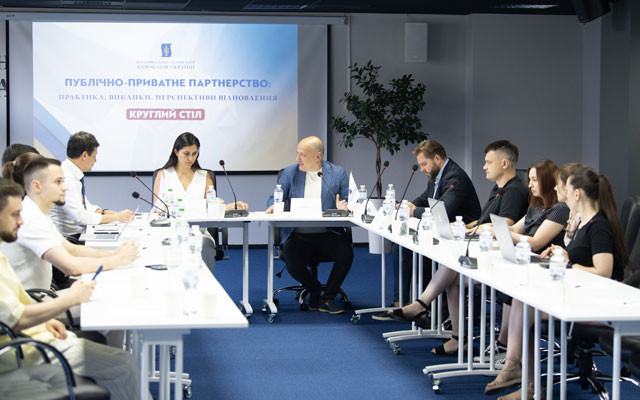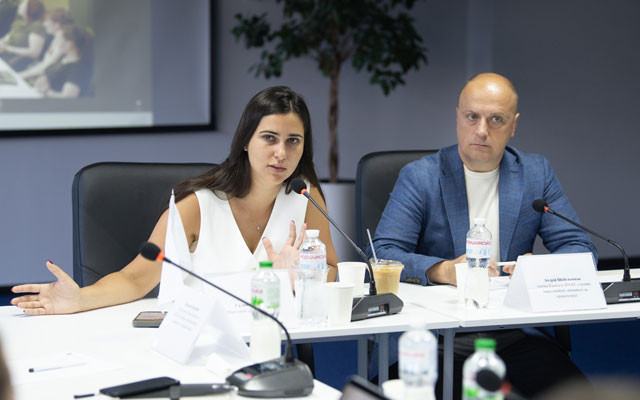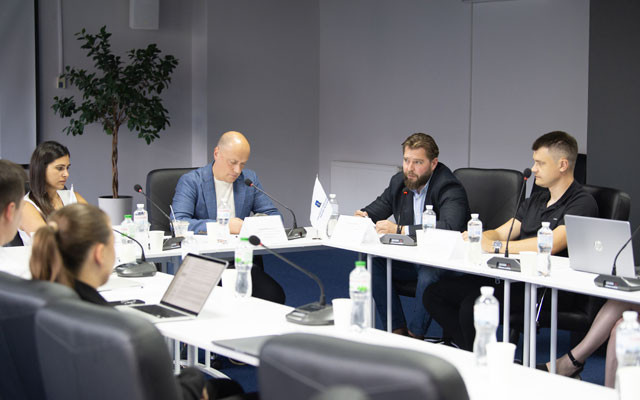
Partnership for reconstruction: UNBA discusses new law on PPPs



Public-private partnerships are considered one of the key tools for Ukraine's recovery, but in practice, their mechanisms remain complex, poorly understood, and often ineffective.
Ways to improve legislation and real challenges for launching PPPs in housing and utilities, infrastructure, healthcare, and defense were discussed by participants of the roundtable «Public-private partnership issues: current practice and regulatory improvements», held on August 5 at the Ukrainian National Bar Association. The event was organized by the UNBA Committee on investment and privatization. The focus was on analyzing the new Law No. 4510-IX and its potential for attracting private capital to post-war reconstruction.
Positive and negative experience
Committee member Vitaliy Mazur cited the modernization of the water treatment system in Cherkasy as a successful example of public-private partnership in the housing and utilities sector. Thanks to the project, more than 150,000 residents gained access to quality drinking water. At the same time, most initiatives in this area never reach the implementation stage. Among the main reasons, the speaker noted the war, the complexity of procedures and uncertainty at the stage of approval of the feasibility study, as well as delays in the consideration of tender documentation.
One of the key constraints is the lack of adequate budgetary funding, both at the state and local levels. The authorities' focus on avoiding financial guarantees makes it impossible to attract bank lending. Operational readiness payments, which are not properly enshrined in financial commitments, remain a separate challenge. Litigation is another serious barrier: for example, the project to build a waste processing complex in the Lviv region was blocked due to lawsuits filed by local residents.
In addition, according to the speaker, the state does not do enough to explain the situation to potential investors. The lack of information about the opportunities and benefits of PPPs reduces business interest. It was precisely to overcome these problems that Draft Law No. 7508 «On amendments to certain legislative acts of Ukraine on improving the mechanism for attracting private investment using the mechanism of public-private partnerships-private partnership to accelerate the restoration of war-damaged facilities and the construction of new facilities related to the post-war reconstruction of Ukraine's economy».
The problem of institutional vulnerability of investors in existing PPPs was also raised by the deputy chairman of the Committee, Vitaliy Zhadobin. According to him, a typical example is the situation with Hydropark in Kyiv: the city provided the infrastructure in the form of the Venice Bridge, and a private partner invested in the creation of sports facilities—football pitches, arenas, and courts. However, attracting additional funding even for the further development of such projects is hampered by the lack of a transparent procedure. Therefore, the introduction of a new regulatory framework for PPPs could remedy this situation and create legal conditions for civilized investment.
From a long road to a new model
According to MP Galina Yanchenko, author of draft law No. 7508, the need to update legislation on public-private partnerships became apparent even before the full-scale invasion.
However, the 2010 law was effectively non-functional: over the course of a decade, there were almost no examples of successful PPP implementation, with the exception of a few concessions. All attempts to launch new projects were blocked by cumbersome procedures, a lack of expertise among government officials, and the virtual absence of a decision-making mechanism. In some cases, it was not even possible to form the relevant commission, which made it impossible to consider the initiative.
After the start of the large-scale war, when the scale of destruction reached a critical level, the concept took on a new meaning. Whereas previously the focus was on creating conditions for attracting investment, now it is one of the main tools for rebuilding the state. That is why the team of authors of the draft law decided to completely restart the PPP logic.
All procedures were analyzed in terms of time consumption. For each of the more than 20 stages, the possibility of their elimination or simplification was identified. For example, it is proposed to abandon administrative appeals to the Antimonopoly Committee, which were often used to delay the process, and allow direct recourse to the courts. Overall, as a result of the changes, the launch of a large project can be reduced from three years to one, and a recovery or small project to six months. The draft law provides for the introduction of simplified procedures for small projects (up to $5.2 million) and restoration projects.
For the first time, the implementation of PPPs in the defense sector has been permitted at the legislative level, taking into account the specific nature of access, security, and safety. Prospects for attracting private investors to social projects such as hospitals, schools, and kindergartens have been outlined.
G. Yanchenko emphasized that all the work was carried out using the full cycle policy method — from identifying the problem and consulting with stakeholders to formulating the concept, discussing it with the professional community, and preparing the draft law. This made it possible to maintain the logic of the reform despite significant resistance, particularly from some European colleagues who insisted on a return to more complex procedures. As a result, the draft submitted back in 2022 was finally adopted by the Verkhovna Rada in June 2025 (the text of Law No. 4510-IX can be found here).
Infrastructure deficit — an excess of obstacles
Representing the local government, Oleksandr Demochka, a member of the Borshchahivska village council in the Bucha district of the Kyiv region, described the situation in his community as indicative of the potential and, at the same time, the difficulties of launching PPPs at the local government level. The Borshchahivska community consists of three settlements with almost 30,000 internally displaced persons registered. The actual population exceeds 140,000 people, which creates a critical burden on infrastructure, particularly the healthcare system. Despite the need for a full-fledged hospital, the implementation of such a project is hampered by numerous procedural barriers.
The speaker emphasized that the community has the necessary prerequisites for PPPs, but projects that could improve the quality of life of residents are stalled at the initial stages due to the inertia of local authorities. After all, the implementation of a partnership project requires a council decision, and it is at this stage that blockages often arise.
At the end of the event, its moderator, Committee chairman Andriy Shabelnikov, thanked the participants for their frank discussion and confirmed that the issues raised resonated with the experience of local self-government. In his opinion, Galina Yanchenko's example shows that young professionals can and should influence policy-making. At the same time, the level of local governance is still often determined by petty interests and resistance to change, even in wartime. A. Shabelnikov also announced further activities of the Committee, including a separate roundtable dedicated to legislative initiatives in the field of business protection, which also require consideration and support.
© 2025 Unba.org.ua Всі права захищені
"Національна Асоціація Адвокатів України". Передрук та інше використання матеріалів, що розміщені на даному веб-сайті дозволяється за умови посилання на джерело. Інтернет-видання та засоби масової інформації можуть використовувати матеріали сайту, розміщувати відео з офіційного веб-сайту Національної Асоціації Адвокатів України на власних веб-сторінках, за умови гіперпосилання на офіційний веб-сайт Національної Асоціації Адвокатів України. Заборонено передрук та використання матеріалів, у яких міститься посилання на інші інтернет-видання та засоби масової інформації. Матеріали позначені міткою "Реклама", публікуються на правах реклами.